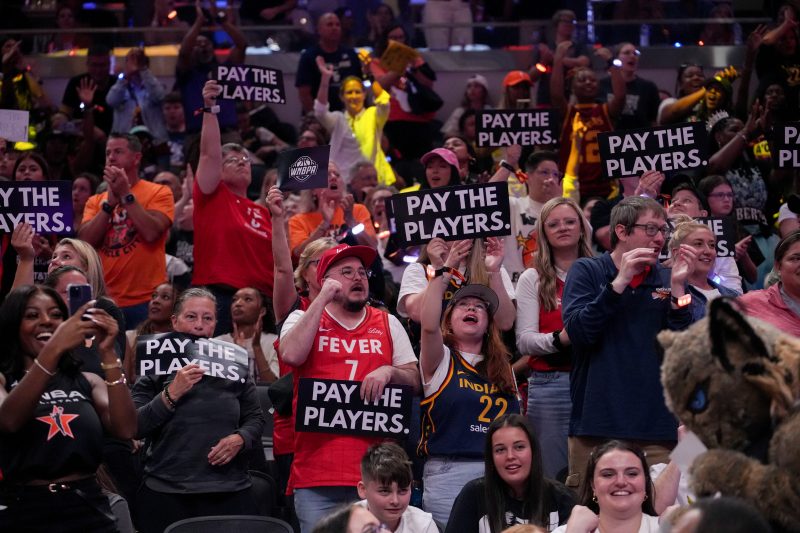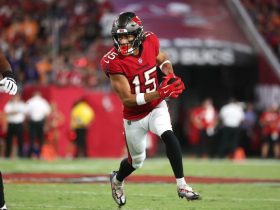INDIANAPOLIS — In case their message to the WNBA and its owners wasn’t already clear, the players sent another one ahead of the All-Star Game.
Taking the court for warmups, every single player wore a black T-shirt with “Pay Us What You Owe Us” emblazoned across the front.
“We should be paid more and hopefully that’s the case moving forward as we continue to grow,” Caitlin Clark said ahead of Saturday night’s game. ‘That’s probably the most important thing that we’re advocating for.”
The players’ unwavering stance stands in stark contrast to WNBA commissioner Cathy Engelbert’s almost-Pollyannish take in her annual ‘state of the union’ address. To hear Engelbert tell it, everything is hunky dory and this is just the normal back-and-forth that occurs in every labor negotiation.
‘I want to call it constructive. We had a candid dialogue and this is part of the process,” Engelbert said.
Maybe that’s what Engelbert has to say publicly. But she had better be far more unsparing when she’s talking to WNBA owners. Because this contract won’t only be transformational for the WNBA and its players, it will define Engelbert’s legacy.
Engelbert will either be the commissioner who oversaw a historic righting of wrongs for women athletes. Or she’ll be the one who drove this rocket-fueled league into a ditch.
‘I just want to say I really respect the players,” Engelbert said before the game. ‘The goal (is) to have a fair CBA for all. I want a lot of the same things the players want. I said that last time, too, and it’s not changed. But we also have to have a process where we go back and forth, and that’s where we are in the process.
‘So again, still really optimistic that we’ll get something done, that it’ll be transformational, and that next year at All-Star we’ll be talking about how great everything is,’ Engelbert said. ‘But, obviously, there’s a lot of hard work to be done on both sides to get there.’
The crowd booed Engelbert and chanted ‘Pay Them! Pay Them!’ as she presented the All-Star MVP trophy to Napheesa Collier, whose team beat Team Clark 151-131.
Again, Engelbert has to speak carefully. She answers not only to the WNBA owners, but to the NBA. Anyone who’s ever heard NFL commissioner Roger Goodell speak for more than 30 seconds understands this.
But the players aren’t stupid, and Engelbert would be wise to remember that when she tries to sell a narrative that is as insulting as it is disingenuous.
Take what she said about revenue sharing. This, along with higher salaries, is a priority for the players, who see the league and its owners reaping the benefits of the WNBA’s popularity and wonder when it’s going to be their turn.
When Engelbert was asked about this, she said the league has revenue sharing. Sorry, but players only getting 10% when all of the major men’s professional leagues have 50/50 splits, is not revenue sharing. It’s an allowance.
A bad one at that.
‘We want to significantly increase their salary and benefits while balancing with our owners’ ability to have a path to profitability, as well as to continued investment,” Engelbert said.
‘You see tens of millions of dollars being invested in practice facilities and other player experiences by teams, and we want to strike the right balance between those two,” Engelbert said. ‘That’s helped our hypergrowth, it’s helped our free agency, it’s helped our players play in places where they’re getting a great player experience.”
And therein is the disconnect.
No one ever asks NBA or NFL players to take a discount because they’ve got a swanky new locker room or are flying charter. These are considered the cost of doing business in the big leagues, and it should be no different in the WNBA. The players deserve first-class facilities because they’re world-class athletes, and they shouldn’t have to forego some of their earnings to get them.
It’s true the NBA helped keep the league afloat for many years — though just once I’d like the folks who use this to diminish the W to consider the systemic misogyny responsible for this — and those owners want compensation for that investment. But team valuations are not skyrocketing and sponsors are not flocking to the W because of the owners.
They’re coming because of the players. Because of Clark and Paige Bueckers and Angel Reese and Napheesa Collier and Sabrina Ionescu and, soon, Azzi Fudd and JuJu Watkins.
‘Having new brands come in, having new sponsors come in, is exactly what we want. We just also want to reap the benefits of that,” said Collier, who was an All-Star captain along with Clark. “We’ve been a part of that growth. We just want to make sure that we are also getting a cut of all this new money that’s coming in.’
Engelbert gushed about All-Star weekend, and rightfully so. It wasn’t so long ago that this was a game and little else. Now it’s an event, with parties and sponsor activations and celebrities courtside and a fanfest and merch stores and, and, and — same as the NBA’s All-Star Game. The players inserted themselves into casual conversation, with A’ja Wilson dropping a new show and the ‘StudBudz” becoming an internet sensation.
It was a celebration of what the WNBA has become and a glimpse of everything still to come, and shame on Engelbert if she can’t make the NBA and WNBA owners recognize the gold mine they’re sitting on.
‘We’re not going to be in hypergrowth forever. No company ever is,” Engelbert said. ‘So it’s how to continue to sustain this momentum, gain on it, grow and, ultimately, globalizing the game.’
And define her legacy as commissioner. The clock is ticking on more than just these CBA negotiations.
Follow USA TODAY Sports columnist Nancy Armour on social media @nrarmour.






